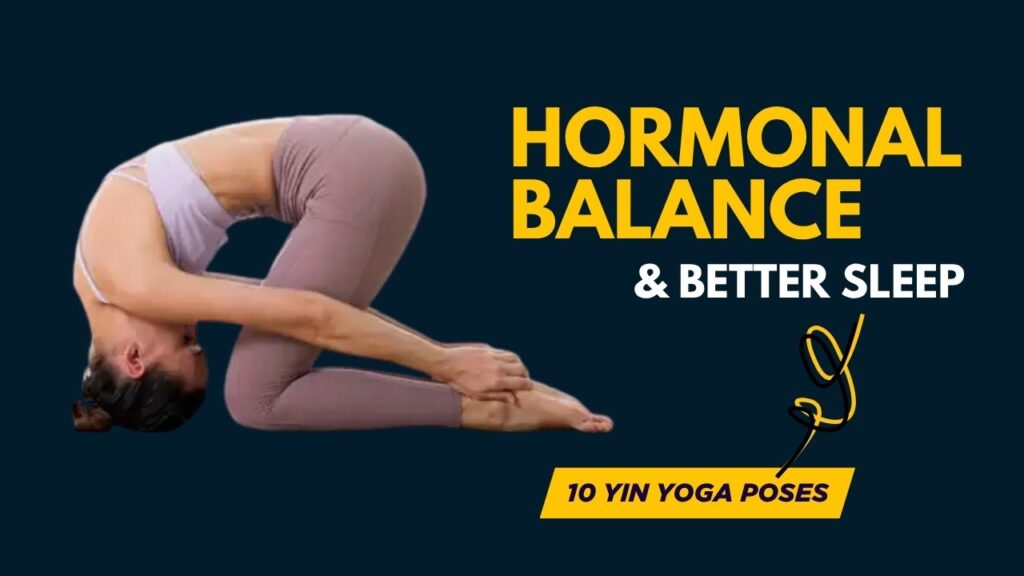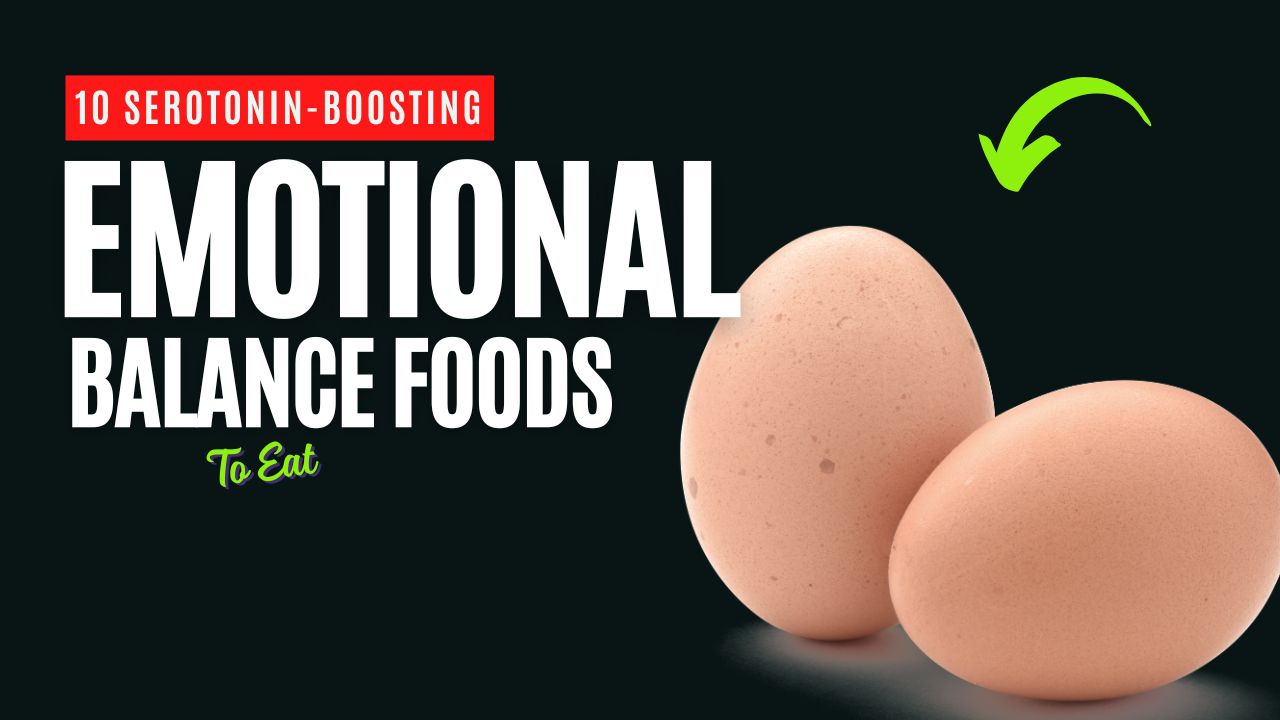Most people chase complex solutions to fix hormone imbalances, anxiety, and sleepless nights. But what if the answer is as simple as slowing down?
Yin Yoga, a deeply restorative and passive style of yoga, works with your body’s connective tissues and energy channels to release blocked emotions, regulate hormones, and calm the nervous system. Unlike fast-paced vinyasa, Yin asks you to hold each pose longer — not for intensity, but for healing.
Whether you struggle with PMS, PCOS, adrenal fatigue, mood swings, or insomnia — Yin Yoga can gently unlock relief.
This article walks you through 10 science-backed Yin Yoga poses designed to bring hormonal harmony, mental clarity, and restful sleep, with easy-to-follow ‘how to’ instructions.

Table of Contents
Why Yin Yoga Works for Hormones and Sleep
Before diving into the poses, let’s bust a common myth:
“Yoga is just for flexibility.”
Not true. Especially not with Yin. Yin Yoga targets the fascia, ligaments, and meridian lines — which in Traditional Chinese Medicine are believed to be directly connected to organs responsible for hormone production and regulation, such as the kidneys, liver, and spleen.
When you remain in a Yin pose for 2–5 minutes, it activates your parasympathetic nervous system, signaling your body to shift into rest-and-digest mode.
This reduces cortisol (the stress hormone), regulates insulin, and improves melatonin production — the hormone responsible for deep, quality sleep.
What Can Happen After 30 Days of Practicing Yin Yoga
| Benefits | What You May Notice |
|---|---|
| Hormonal Balance | Reduced PMS symptoms, improved cycle regularity, better thyroid and adrenal function |
| Improved Sleep Quality | Falling asleep faster, staying asleep longer, waking up more refreshed |
| Reduced Stress & Anxiety | Calmer mood, better emotional regulation, fewer stress-related physical symptoms |
| Enhanced Flexibility & Joint Mobility | Deeper stretches, more ease in daily movements, less stiffness |
| Better Digestion | Less bloating, more regular bowel movements, improved gut health |
| Increased Mindfulness | Sharper focus, reduced overthinking, greater emotional awareness |
| Improved Energy Flow | A sense of lightness, reduced fatigue, better alignment of body and breath |
| Greater Emotional Resilience | Ability to stay grounded during mood swings or stressful situations |
Yin Yoga for Hormonal Balance: Do’s & Don’ts
| Do | Don’t |
|---|---|
| Hold each pose for at least 2–5 minutes | Rush through poses or force your body |
| Use props (bolsters, pillows, blankets) for support | Skip support if you feel strain or discomfort |
| Breathe slowly and deeply throughout each pose | Hold your breath or breathe shallowly |
| Stay mindful and connected to bodily sensations | Zone out or push through pain |
| Practice in a quiet, dim space to encourage relaxation | Practice in a noisy, stimulating environment |
| End your session with Savasana to integrate benefits | Skip final relaxation or abruptly end the practice |
| Wear loose, comfortable clothing for better circulation | Wear tight or restrictive clothes that limit movement |
| Be consistent — even short, regular sessions create change | Expect instant results from a single session |
10 Yin Yoga Poses for Deep Hormonal Balance, Stress Relief & Better Sleep
1. Butterfly Pose (Baddha Konasana)
Targets: Reproductive organs, ovaries, hips, inner thighs
How to:
- Sit with feet together, knees dropped open.
- Let your spine round and fold forward naturally.
- Hold for 3–5 minutes, breathing slowly.
Why it helps: Stimulates the kidney and liver meridians, supports fertility and menstrual regulation.
2. Dragon Pose (Lunge Variation)
Targets: Hips, groin, adrenals
How to:
- Step one foot forward into a low lunge, back leg extended.
- Sink hips down and keep the upper body tall or rest forearms on the floor.
- Hold for 2–4 minutes each side.
Why it helps: Opens the hip flexors, which often store emotional tension, and activates adrenal recovery.
3. Caterpillar Pose (Seated Forward Fold)
Targets: Spine, hamstrings, central nervous system
How to:
- Sit with legs extended, feet relaxed.
- Fold forward gently, letting spine round and head drop.
- Hold for 3–5 minutes.
Why it helps: Calms the nervous system, boosts melatonin, and eases mental fatigue.
4. Reclined Butterfly (Supta Baddha Konasana)
Targets: Heart chakra, pelvis, hormonal axis
How to:
- Lie on your back with feet together and knees open.
- Use pillows under knees for support.
- Stay here for 5–7 minutes.
Why it helps: Promotes a sense of surrender, supports hormonal detoxification via liver and ovaries.
5. Melting Heart (Anahatasana)
Targets: Upper back, thyroid, chest
How to:
- Come onto all fours and walk your hands forward.
- Let your chest melt down while keeping hips over knees.
- Hold for 3 minutes.
Why it helps: Opens the heart and throat — areas associated with emotional release and thyroid regulation.
6. Reclining Twist (Supta Matsyendrasana)
Targets: Spine, digestion, endocrine system
How to:
- Lie on your back, draw one knee across the body.
- Extend opposite arm and gaze in that direction.
- Hold each side for 2–4 minutes.
Why it helps: Stimulates digestion, gently massages adrenal glands, aids in detoxification.
7. Dragonfly (Wide-Legged Seated Fold)
Targets: Liver, kidneys, inner thighs
How to:
- Sit with legs wide, knees straight but relaxed.
- Hinge at hips to fold forward.
- Hold for 4–5 minutes.
Why it helps: Improves circulation to reproductive organs and supports estrogen balance.
8. Sphinx Pose
Targets: Lower back, adrenal glands, nervous system
How to:
- Lie on your belly, elbows under shoulders, lifting chest slightly.
- Relax glutes and legs.
- Hold for 2–4 minutes.
Why it helps: Stimulates the kidney and adrenal meridians, boosts mood and energy without overstimulation.
9. Legs Up the Wall (Viparita Karani)
Targets: Lymphatic system, sleep hormones
How to:
- Sit sideways to a wall, swing your legs up as you lie on your back.
- Arms relaxed, close your eyes.
- Stay here for 5–10 minutes.
Why it helps: Reduces stress hormone levels, calms the mind, promotes restful sleep and hormonal reset.
10. Savasana (Corpse Pose)
Targets: Total nervous system relaxation
How to:
- Lie flat on your back, legs and arms gently spread.
- Close eyes and surrender your weight into the floor.
- Stay for 5–10 minutes.
Why it helps: Encourages integration, deep relaxation, and supports all hormonal healing work done in the session.
Conclusion
Yin Yoga offers more than just flexibility — it’s a healing system that speaks directly to your hormonal health, emotional balance, and nervous system. By holding these restorative poses gently and mindfully, you create space for your body to reset from the inside out.
Whether you’re managing stress, struggling with sleep, or facing hormone-related challenges like PMS, PCOS, or adrenal fatigue, these Yin Yoga poses can offer powerful, natural support. The key lies in consistency, presence, and allowing your body the time it needs to unwind and restore.
Remember: the most profound transformations often come from the quietest moments. So unroll your mat, slow down, and give yourself permission to just be. Your hormones — and your whole being — will thank you.
Frequently Asked Questions (FAQs)
Can Yin Yoga really help with hormonal imbalance?
Yes. Yin Yoga stimulates energy channels and meridians associated with organs like the liver, kidneys, and adrenal glands — all key players in hormonal regulation. Over time, it can support better hormonal balance through reduced stress and improved circulation.
How often should I practice these Yin Yoga poses for results?
Aim for 3–5 sessions per week. Even practicing for 20–30 minutes on alternate days can help restore hormonal function and improve sleep patterns when done consistently.
Do I need props for Yin Yoga?
Props like bolsters, pillows, yoga blocks, or blankets are optional but highly recommended. They support the body in long holds, reduce strain, and help deepen relaxation.
Is it safe to do Yin Yoga during menstruation?
Absolutely. Yin Yoga can ease menstrual cramps, calm mood swings, and improve flow. Gentle poses like Reclined Butterfly or Legs Up the Wall are particularly soothing during menstruation.
Can beginners do Yin Yoga?
Yes. Yin Yoga is beginner-friendly and does not require strength or flexibility. The focus is on stillness, breath, and deep tissue release — making it accessible for all levels.
How long should I hold each pose?
Hold each pose for 2 to 5 minutes, depending on your comfort level. Longer holds (up to 7 minutes) are ideal for advanced practitioners but not necessary to experience benefits.
What time of day is best for practicing Yin Yoga?
Evenings or before bed are ideal. Yin Yoga activates the parasympathetic nervous system, making it perfect for winding down and preparing for restful sleep.










